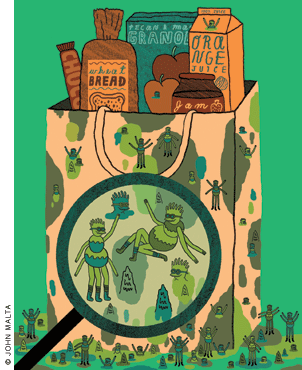 It’s hard to do a good deed for the environment these days. Cloth diapers for your baby? Well, there’s the environmental cost of the extra washing water and detergent they require. Trying to buy local food? Your choice is partially undercut by the inefficiencies of small-scale farming. But what about reusable grocery bags? Surely those, at least, are an unalloyed good.
It’s hard to do a good deed for the environment these days. Cloth diapers for your baby? Well, there’s the environmental cost of the extra washing water and detergent they require. Trying to buy local food? Your choice is partially undercut by the inefficiencies of small-scale farming. But what about reusable grocery bags? Surely those, at least, are an unalloyed good.
Not according to Jonathan Klick, who says that not only do reusable bags stand to harm the environment—they also put your family’s health at risk.
Klick, a Penn Law professor (who also boasts a PhD in economics), came to that conclusion after investigating data from that most eco-conscious of places: San Francisco. That city banned disposable plastic bags in 2007—a victory for environmentalists who implicate plastic bags in the deaths of hundreds of thousands of marine animals annually. But Klick believes he has discovered an unintended consequence of that law. Soon after the ban was passed, hospitalizations and deaths from foodborne illnesses like E. coli nearly doubled.
Klick and his co-author, Joshua Wright of George Mason University Law School, offer an explanation for this trend in a working paper released in August titled “Grocery Bags and Foodborne Illness.”
“Food safety research,” says Klick, “has shown that a large percentage of reusable bags actually contain harmful bacteria.”
Indeed, they can be hotbeds. Klick cites one study in which researchers randomly stopped shoppers on their way into grocery stores, and found that 8 percent of reusable bags tested positive for E. coli. Just as importantly, 97 percent of shoppers reported that they had never washed their reusable bags—not one single time.
The prevalence of infected reusable bags supported Klick’s suspicion that San Francisco’s plastic bag ban was making the city sick. Still, he wanted to rule out other potential causes, like the possibility that the Bay Area had been experiencing a general outbreak of E. coli at this time. To do that, he compared data from San Francisco, which had passed a plastic bag ban, with data from Oakland, which had not. He found that rates of foodborne illnesses had spiked on the west side of the bay at the same time they’d been stable on the east side.
“At the end of the day, we have a scientific basis that suggests this is a plausible idea,” Klick says. “That leads us to be fairly confident of these results.”
But that still left the policy question unanswered: Had the bag ban actually done more harm than good? That was where Klick turned next. On one side, he tried to quantify the cost of the five to 15 additional deaths from food poisoning he attributed to the ban. Using the Environmental Protection Agency’s estimated value of a statistical life, he put the cost between $43 million and $133 million. Then he looked at the ban’s benefits—including the reduced sanitation burden on the city, and the value of the birds and marine animals whose lives were saved because there were fewer plastic bags around to choke on.
Measured this way, the ban started to look pretty expensive.
Klick calculates that for the ban to break even economically, each animal saved would have to be valued at between $87,500 and $307,500.
Of course, people could just wash their reusable bags, which would preserve the environmental benefits of the ban while mitigating the health costs. But even here, Klick contends that things aren’t that simple.
“Reusable bags take so many more energy resources to make in the first place that to be environmentally effective they need to be used somewhere between 120 and 170 times,” he says. “It turns out that if you end up washing your bags every time you use them, there’s no way they’re going to last for 120 uses.”
Some of the law’s supporters object to his analysis. For example, the number of deaths he attributes to reusable bags is small, especially in a large metropolitan population analyzed over several years, which makes it difficult to distinguish between a real causal relationship and a statistical blip. And some argue that putting a price on the head of a bird is an inadequate way to measure the full benefits of conservation laws.
Klick—who uses neither plastic bags nor reusable ones and instead transports his food, loose, into the trunk of his car—says that he’s agnostic about the political dimensions of the bag ban.
“I view my role as an economist is to provide the inputs to the analysis, while leaving the trade-offs to politicians and voters,” he says. “The important thing here is that there are costs people haven’t previously considered. Here’s some new data, so now have the debate again.”
—Kevin Hartnett

